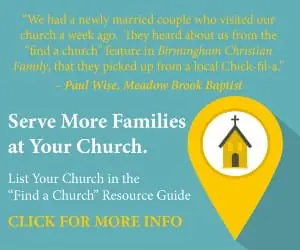Strong Faith, Strong Voice
A former professional soccer player and a 10-year Veteran of the U.S. Women’s National Team, Birmingham native Catherine Reddick Whitehill says playing for Briarwood Christian School was an integral part of her athletic development. It also bolstered the Christian faith encouraged by her parents. Returning to Birmingham to be inducted into the Alabama Sports Hall of Fame this month, Whitehill reflects on the soccer and faith influences of her hometown.
A forward for Briarwood Christian School from 1996-2000, Whitehill’s memories of growing up in Birmingham include date nights with her father, Rev. Phil Reddick, an associate pastor at Briarwood Presbyterian Church. “We’d go to a local Mexican restaurant, currently it’s El Poblano, which is in Rocky Ridge. It’s a small place, but we love it. When I got a little bit older, it was a morning date to Chick-fil-A every Thursday. My dad and I would go to breakfast there and [talk] football. We kept a running tally of the games over the year, and whoever won bought the other person lunch.”
While a student at Briarwood, Whitehill says she was influenced heavily by Bible teacher Fran Sciacca, who taught courses on Old and New Testament Survey as well as 21st Century Faith. “We’d go through every single book of the Bible and find a keyword, key verse, key story. I still have that to this day,” she recalls. “He [encouraged] us to think outside the box, not just be in our own world. He taught us about challenges we were going to face when we went to college and the real world.”

As a young athlete, Whitehill struggled to find competitive girls club teams to help grow her talent. She spent much of her childhood through middle school playing for The Attack, a selective boys’ team. Her sophomore year at Briarwood, she was selected for the Olympic Development Program (ODP) Regional Team, then made the U-16 National Team. She went on to play on the U-18 and U-21 National Team, and her freshman year at the University of North Carolina, she earned a spot on the National Team as a defender alongside veteran players Mia Hamm, Julie Foudy, and Kristine Lilly. As she adjusted to being a bit starstruck, a call from college coach Anson Dorrance helped her refocus. “I guess he had gotten a call from the national team coach who said I was being too tentative at practice. He called me up and said, ‘Stop genuflecting on Mia Hamm and play like Cat Reddick.’ I had her poster on the wall when I was a kid. That was scary at first, but thankfully I got over it.” Her senior year of college she won a gold medal with the team at the Olympic Games in Athens, Greece.
After college, Whitehill married husband Robert and continued her career with the U.S. National Team playing soccer professionally for the Washington Freedom (2009-2010), Atlanta Beat (2011) and Boston Breakers (2012-2015). Her friend group had served as her faith-based community in college, and leaving that behind proved challenging. “I had such a good foundation growing up with my family. I love the fact that I have been able to get to know different cultures, get to know different people. [Travel] it made my faith even stronger because there’s not a lot of close friends out on the road. It’s a pretty lonely feeling, so you really dive into the Bible a lot or listen to a sermon or a podcast. It was really important to have that,” she says. With each new professional contract, in each new city, she also had to find a new place to worship.

Although she is now retired from professional soccer, Whitehill recalls the strengths that made her so successful on the field, particularly as she moved to a position on defense. “I see the game really well. A lot of times I see where the forward is going to be before the forward even gets there,” she says. “Because my vision was so good, I was able to get into a position that would beat the forward where I wouldn’t have to get into a race with them. My longball was another strength of mine. I worked on that all the time, both feet.”
Now retired as an athlete, new successes for Whitehill include soccer commentary for FOX and ESPN, coaching in Boston and focusing on women’s rights. She recently traveled to Tajikistan with the U.S. Embassy to help women learn how to play soccer. “I went to help women who don’t have equal rights as men. We taught some of their coaches the best way to train because they don’t think they should train the girls the same way as boys,” she says.

Now living in Georgia, where her husband works as a pediatric cardiologist at Children’s Hospital of Atlanta, Whitehill hopes to return to the sport as a coach in the south, tuned in to what modern girls need to hear from mentors. “They need someone to believe in them. And I think they need honesty,” she says. “I told my players [in Boston], if you don’t want to know the answer, don’t ask the question. I’m going to tell them the truth, and that goes a long way. It’s the best way to learn. You show them that you believe in them, not just as soccer players but as strong women. And you show them how women can be–how we can use our voices in a way that is so powerful.
- Camille Platt








